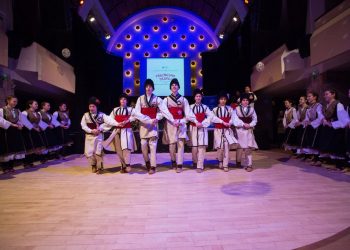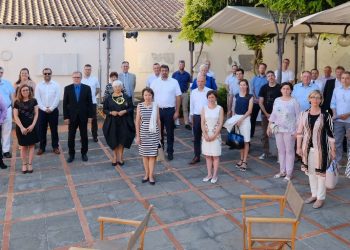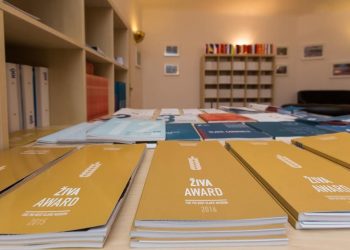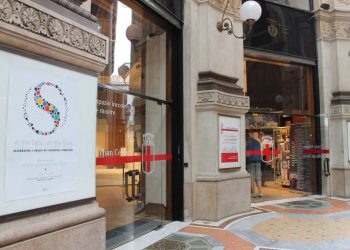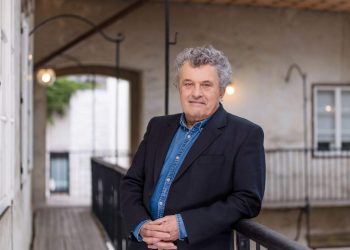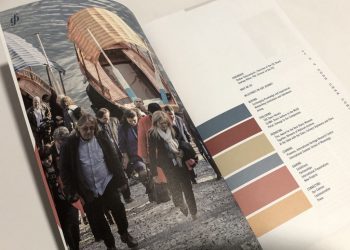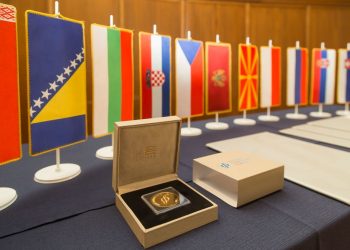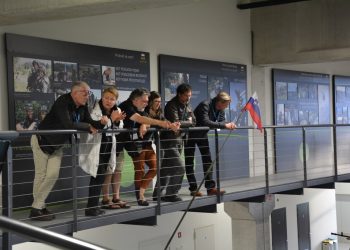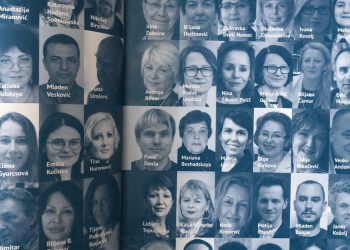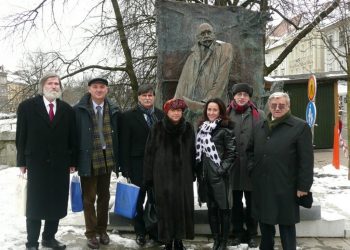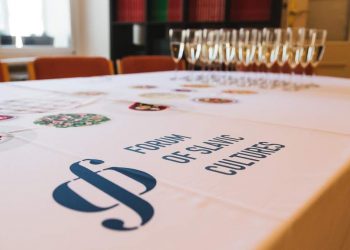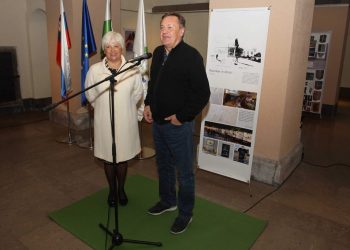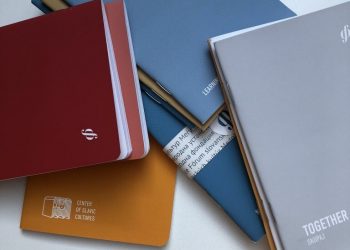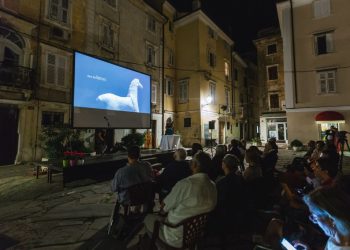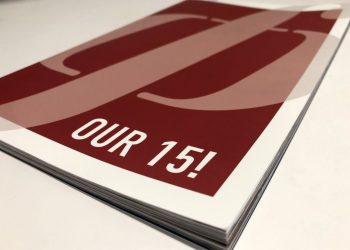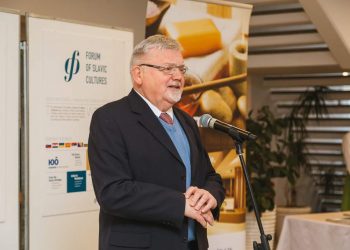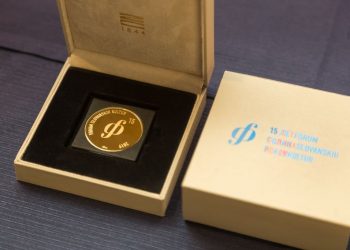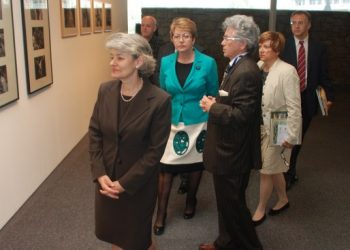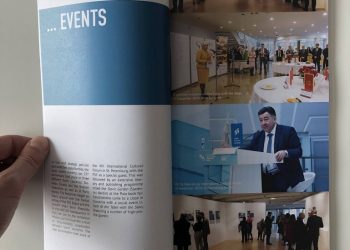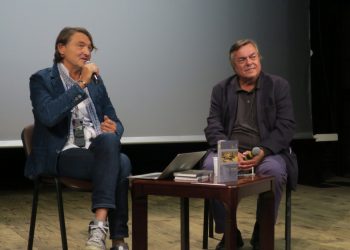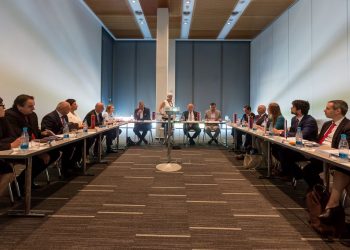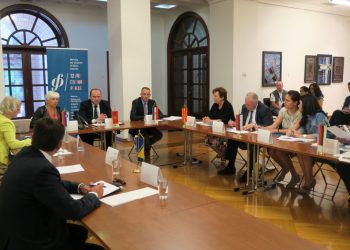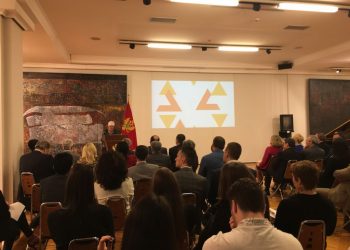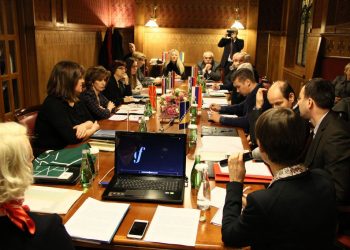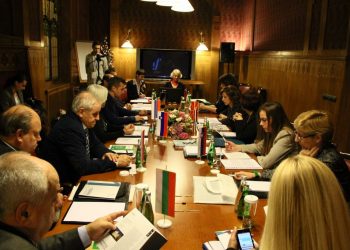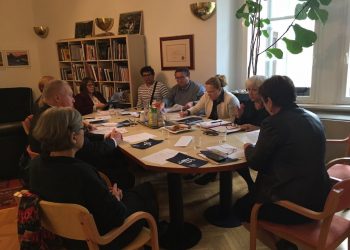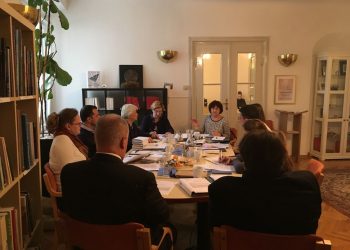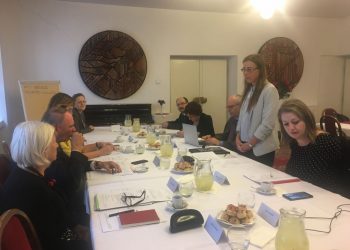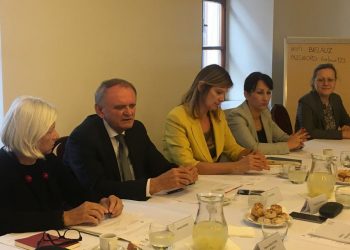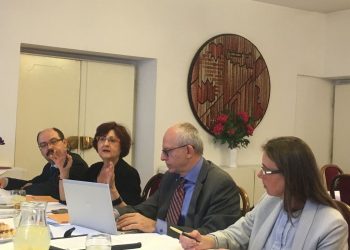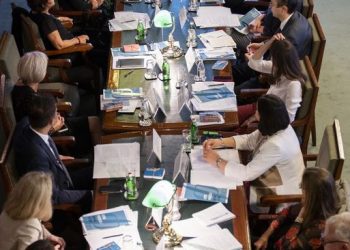O nás
Fórum slovanských kultúr (FSK) je medzinárodná nezisková inštitúcia, ktorá pôsobí vo verejnom záujme. Myšlienka o jeho zrode sa zjavila v kultúrnych kruhoch na začiatku 21. storočia. Inštitúcia FSK bola oficiálne založená v roku 2004 a dnes združuje viac ako 300 miliónov Slovanov v trinástich slovanských krajinách: Bielorusko, Bosna a Hercegovina, Bulharsko, Česká republika, Čierna Hora, Chorvátsko, Poľsko, Ruská federácia, Severné Macedónsko, Slovensko, Slovinsko, Srbsko a Ukrajina.
POSLANIE
Poslaním FSK je podporiť tvorivosť slovanských kultúr. Základným cieľom inštitúcie je prepojiť slovanské kultúrne prostredie a sprítomniť ho v modernom globálnom spoločenskom kontexte.
Fórum slovanských kultúr spája a predstavuje slovanskú kultúru, vedu a umenie, jej tvorivý náboj a dedičstvo, a aktívne sa usiluje o zviditeľnenie príspevku slovanských kultúr ku globálnemu dialógu.
ZÁKLADNÉ ÚDAJE
Názov: Medzinárodná inštitúcia – Fórum slovanských kultúr
Skrátený názov: FSK – Fórum slovanských kultúr
Adresa: Cesta 27. aprila 47, 1000 Ľubľana, Slovinsko
T: +386 (0)8 205 28 00
F: +386 (0)1 256 57 38
E: info@fsk.si
W: http://www.fsk.si
Úradné hodiny: každú stredu od 10:00 do 13:00
IČ DPH: 11734086
Registračné číslo: 2035618
IBAN: SI56 2900 0005 0604 466 (UniCredit Banka Slovenija, d. d., Šmartinska 140, 1000 Ľubľana, Slovinsko; SWIFT / BIC: BACXSI22)
ZÁKLADNÉ DOKUMENTY
ORGÁNY FSK
Predsedníčka správnej rady FSK:
Maja Gojković, podpredsedníčka vlády a ministerka kultúry a informácií Srbskej republiky
Členovia:
- Boil Banov, minister kultúry Bulharskej republiky
- Vesna Bratić, ministerka školstva, vedy, kultúry a športu Čiernohorskej republiky
- Oľga Ľubimova, ministerka kultúry Ruskej federácie
- Nina Obuljen Koržinek, ministerka kultúry Chorvátskej republiky
- Irena Stefoska, ministerka kultúry Republiky Severné Macedónsko
a zástupcovia pozorovateľských krajín.
Predseda: Mladen Vesković / Srbsko
Členovia:
- Gojko Božović / Srbsko
- Dubravka Đurić Nemec / Chorvátsko
- Anatolij Kreidič / Bielorusko
- Tomislav Osmanli / Severné Macedónsko
- Milorad Popović / Čierna Hora
- Julija A. Sozina / Ruská federácia
- Miroslava Vallová / Slovensko
Členovia:
- Aleksandar Arsovski / Severné Macedónsko
- Matea Brstilo Rešetar / Chorvátsko
- Emília Lačná / Slovensko
- Vera Luburić / Čierna Hora
- Aida Šabanović / Bosna a Hercegovina*
- Ognjan Todorov / Bulharsko
- Miroslava Turković / Srbsko
Predsedníčka správnej rady FSK:
Maja Gojković, podpredsedníčka vlády a ministerka kultúry a informácií Srbskej republiky
Členovia:
- Boil Banov, minister kultúry Bulharskej republiky
- Vesna Bratić, ministerka školstva, vedy, kultúry a športu Čiernohorskej republiky
- Oľga Ľubimova, ministerka kultúry Ruskej federácie
- Nina Obuljen Koržinek, ministerka kultúry Chorvátskej republiky
- Irena Stefoska, ministerka kultúry Republiky Severné Macedónsko
a zástupcovia pozorovateľských krajín.
Predsedníčka:
Dubravka Đurić Nemec / Chorvátsko
Členovia:
- Stojanka Atanasova / Bulharsko
- Andrija Radulović / Čierna Hora
- Tanja Đaković / Bosna a Hercegovina*
- Vadim Duda / Ruská federácia
- Tatjana Kraljevska Lazarova / Severné Macedónsko
- Perina Meić / Bosna a Hercegovina*
- Petar Miladinov / Bulharsko
- Gordan Nikolov / Severné Macedónsko
- Julija A. Sozina / Ruská federácia
- Biljana Tudzarovska Kjupeva / Severné Macedónsko
- Mladen Vesković / Srbsko
a zástupcovia pozorovateľských krajín:
- Veronika Faltová / Česká republika
- Miroslav Kaňa / Slovensko
- Viktoria Ratobilska / Bielorusko
- Vojtěch Merunka / Česká republika
*funkcia pozastavená
Predseda: Mladen Vesković / Srbsko
Členovia:
- Gojko Božović / Srbsko
- Dubravka Đurić Nemec / Chorvátsko
- Anatolij Kreidič / Bielorusko
- Tomislav Osmanli / Severné Macedónsko
- Milorad Popović / Čierna Hora
- Julija A. Sozina / Ruská federácia
- Miroslava Vallová / Slovensko
Členovia:
- Aleksandar Arsovski / Severné Macedónsko
- Matea Brstilo Rešetar / Chorvátsko
- Emília Lačná / Slovensko
- Vera Luburić / Čierna Hora
- Aida Šabanović / Bosna a Hercegovina*
- Ognjan Todorov / Bulharsko
- Miroslava Turković / Srbsko
FSK krajiny
KANCELÁRIA FSK
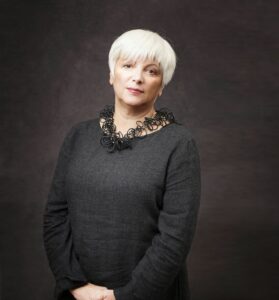
Andreja Rihter, PhD,
Director
E: andreja.rihter@fsk.si
Andreja Rihter was the first President of the Board of the International Foundation– Forum of Slavic Cultures (FSK), serving two terms of office, from its inception in 2004 until 2006 and again from 2008 until 2012, when she was appointed Director of the FSK. She continues to serve as FSK Director today. She is the author of FSK’s first project 100 Slavic Novels, initiator of ŽIVA Award for the best Slavic museum and of the newly developed cultural route project Women Writers Route (WWR) as well as the inceptor of diverse international collaborations between Slavic speaking countries and beyond.
There is an amazing, and growing number of Slavic museums and heritage sites which extend their role in society with a significant local or national impact. That is admirable in itself, but these experiences need to be shared, seen and acknowledged. And the Živa Award – with all its applicants – is a major entrance point for the FSK stakeholders, colleagues and audiences.
The Award serves as a platform for sharing and promoting – in Slavic countries as well as in the broader group of European countries. Both main awards (The Živa Award for the
Best Slavic Museum and the Živa Award for the Best Slavic Heritage Site) are dedicated to the promotion of the protection, preservation, education and communication of museum collections, and of heritage sites, their diversity in type, size and contents as well as their social role by highlighting their innovative and creative approaches, accessibility to the public and openness, their impact on societies, and their contribution to the development of museological principles and ideas.
She obtained her PhD in 2016 with the doctoral dissertation “Heritage of Socialism between Memory and Oblivion” at the Faculty of Arts, University of Ljubljana, after having obtained her master’s degree at the same university in 2008 with her master’s thesis “Development of Tourism in Interwar Celje”.
With a degree in history Andreja Rihter embarked on her professional career in 1981 as a curator at the Museum of Recent History Celje and became its director in 1987.
In 2004, when Slovenia joined the EU, she became the Minister of Culture of the Republic of Slovenia, serving a full term of office. She accumulated more political experience as a Member of Parliament of the Republic of Slovenia between 2008 and 2011. In the same period she was a member of the Parliamentary Assembly of the Council of Europe (2009 – 2011) and President of the Sub-Committee on Cultural Heritage of the Committee on Culture, Science and Sport (2010 – 2011) at the Parliamentary Assembly.
Throughout her career, she has always focused on cultural heritage, history and related activities at the national and international level. In 1991 she became member of the ICOM (International Council of Museums based in Paris) and currently serves as Secretary at the ICOMAM Executive Board (she has been a member of ICOMAM Executive Board since 2016). Upon the founding of the Netherlands-based NGO the European Museum Academy (EMA) in 2009 she became its president and still continues to serve in this capacity. She is also on the panel of judges for the European Museum Awards conferred by the EMA in cooperation with the Micheletti Foundation.
She served as Vice-President of Hands On! – International Association of Children in Museums (2009 – 2019), member of the Board of Directors (2009 – 2015), and currently performs the role of national correspondent.
Before that, in the 1990s, she was very active in Slovenia. She was President of the Museum Association of Slovenia (1998 – 2001), initiator and founder of the School of Museology in Celje (2006) as well as President of the Celje Tourist Association, the oldest tourist association in Slovenia (1997 – 1999).
Andreja Rihter is author of more than 240 scientific, professional and general-interest articles as well as editor of a number of books and catalogues. She regularly attends and organises conferences, roundtables and consultations in Slovenia and abroad.
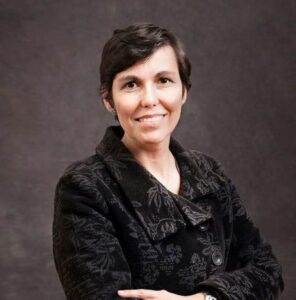
Mateja Jančar
Project Manager
E: mateja.jancar@fsk.si
She graduated in Comparative Literature and Literary Theory and English Language and Literature at the University of Ljubljana. She worked as translator, editor, script writer, PR officer, manager and dramaturg. So far, she has translated nine books and numerous articles, short stories, essays and films. She has experience in project and programme management, organization, publishing, translating and linguistics, and international co-operation.
There is an amazing, and growing number of Slavic museums and heritage sites which extend their role in society with a significant local or national impact. That is admirable in itself, but these experiences need to be shared, seen and acknowledged. And the Živa Award – with all its applicants – is a major entrance point for the FSK stakeholders, colleagues and audiences.
The Award serves as a platform for sharing and promoting – in Slavic countries as well as in the broader group of European countries. Both main awards (The Živa Award for the
Best Slavic Museum and the Živa Award for the Best Slavic Heritage Site) are dedicated to the promotion of the protection, preservation, education and communication of museum collections, and of heritage sites, their diversity in type, size and contents as well as their social role by highlighting their innovative and creative approaches, accessibility to the public and openness, their impact on societies, and their contribution to the development of museological principles and ideas.
Currently she works as a project manager at the International Foundation – Forum of Slavic Cultures; her chief responsibility is the foundation’s literary, publishing and translation programmes. She is also coordinator and Slovenian editor of the 100 Slavic novels series and coordinates the establishment of the new cultural route – Women Writers Route. All project she works on are international and include constant communication in different languages, co-ordination and work in international environment.
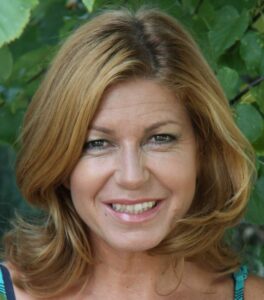
Špela Bogataj
Business Secretary
E: info@fsk.si
After High School of Design and Photography in Ljubljana Špela attended a professional qualification course at Educational Centre Miklošič to become a business secretary. Her first work experience was in a photo studio. She went on to work as a business secretary at the company Arcadia Lightwear, where she helped organise exhibitions and lectures for students and architects.
There is an amazing, and growing number of Slavic museums and heritage sites which extend their role in society with a significant local or national impact. That is admirable in itself, but these experiences need to be shared, seen and acknowledged. And the Živa Award – with all its applicants – is a major entrance point for the FSK stakeholders, colleagues and audiences.
The Award serves as a platform for sharing and promoting – in Slavic countries as well as in the broader group of European countries. Both main awards (The Živa Award for the
Best Slavic Museum and the Živa Award for the Best Slavic Heritage Site) are dedicated to the promotion of the protection, preservation, education and communication of museum collections, and of heritage sites, their diversity in type, size and contents as well as their social role by highlighting their innovative and creative approaches, accessibility to the public and openness, their impact on societies, and their contribution to the development of museological principles and ideas.
She gained experience in working with people, in the field and in the studio, when she joined a casting agency, where she was also in charge of the standard administrative tasks. The next step in her career was opening her own shop with kids’ textiles and accessories, through which she gained extensive experience and knowledge in how to run a business. Throughout her career she developed her business communication skills, and her knowledge of English and Italian helped her to effectively work in different environments. Today she works as a business secretary at the Forum of Slavic Cultures.
HISTÓRIA FSK
Fórum slovanských kultúr (FSK) je nezisková a mimovládna inštitúcia, ktorá v jednej medzinárodnej štruktúre spája Bulharsko, Bosnu a Hercegovinu, Chorvátsko, Severné Macedónsko, Poľsko, Rusko, Srbsko, Čiernu Horu, Slovinsko, Bielorusko, Slovensko, Ukrajinu a Česko. Počas svojho pôsobenia od roku 2004 sa FSK stalo propagátorom aktívneho medzikultúrneho dialógu medzi slovanskými krajinami.
Iniciatíva na založenie Fóra slovanských kultúr (FSK) sa zrodila v roku 2002. Širším východiskom pre jeho vznik boli moderné globalizačné procesy a skutočnosť, že slovanské krajiny vstúpili do Európskej únie. V decembri toho roku sa na podnet slovinskej ministerky kultúry v obci Brdo pri Kranju v Slovinsku neformálne stretli ministri kultúry z krajín, ktorých obyvatelia hovoria slovanskými jazykmi. Po obsiahlych predbežných prípravách a dohodách sa vypracovalo spoločné vyhlásenie, aby krajiny posilnili a podnecovali vzájomnú spoluprácu v oblasti kultúry v najširšom slova zmysle a urýchlili spoluprácu v európskych a ďalších medzinárodných organizáciách v rámci Fóra slovanských kultúr, ktoré bude mať sídlo v Ľubľane. Medzinárodná inštitúcia Fórum slovanských kultúr bola založená v roku 2004 vládou Slovinskej republiky. Členov do prvej správnej rady FSK vymenovali Slovinsko, Bulharsko, Bosna a Hercegovina, Chorvátsko, Severné Macedónsko, Poľsko, Rusko a Srbsko a Čierna Hora. Ustanovujúce zasadnutie Správnej rady FSK sa uskutočnilo 29. júna 2004 v Ľubľane. 20. a 21. marca 2006 sa v Ľubľane uskutočnilo aj ustanovujúce zasadnutie Programovej rady FSK.
Inštitúcia si pôvodne stanovila dva dlhodobé ciele:
- Podnecovanie rozvoja kultúrnej spolupráce medzi všetkými krajinami, ktorých obyvatelia hovoria slovanskými jazykmi. Výmenou informácií a poznatkov a ich priamym šírením medzi verejnosťou môže prispieť k lepšiemu vzájomnému poznaniu zúčastnených krajín.
- Podnecovanie rozvoja kultúrnej spolupráce medzi všetkými krajinami sveta. Aby slovanské kultúry boli rozpoznateľné a atraktívne aj za jazykovými hranicami slovanských krajín. Podpora väčšieho záujmu a lepšieho porozumenia sveta, najmä v rámci EÚ a iných jazykových oblastí sveta.
Inštitúcia od samého začiatku prostredníctvom svojich projektov presadzuje kultúrnu spoluprácu, vzájomné spoznávanie a dialóg kultúrnych dejateľov slovanských krajín, ktoré sú založené na rovnocennej účasti, a nielen na jazykovom nacionalizme, čo kedysi bolo cieľom panslavizmu. FSK posilňuje aktivity spolupráce v oblasti umenia, literatúry, vzdelávania a výskumu.
Dôležitým faktorom pri formovaní vlastnej národnej kultúry je uvedomovať si, v čom sa líši od iných, aj keď do veľkej miery príbuzných kultúr. Ak sa na svoju vlastnú kultúru pozeráme ako na izolovaný, neopakovateľný jav, potom neexistuje ani potreba naďalej ju rozvíjať, obohacovať ju a pýšiť sa ňou pred ostatnými – výnimočnosť kultúry sa zrodí až vtedy, keď svoju kultúru oddelíme od ostatných. Pritom však musíme najprv dobre poznať iné kultúry a umožniť im prekročiť svoj kultúrny prah, pretože iba pri splynutí rôznych kultúr môžeme skutočne pochopiť a správne vyhodnotiť svoju vlastnú výnimočnosť.
Sídlo inštitúcie
Vďaka svojej geopolitickej polohe je Slovinsko „prirodzeným“ iniciátorom uvedeného spájania – spájania krajín, v ktorých hovoríme slovanskými jazykmi. Nachádza sa na západnom okraji slovanského sveta a zároveň je členskou krajinou EÚ. Spolu so záujmom o vlastnú kultúru a identitu prináša do EÚ širší záujem o spájanie, čo zvyšuje reputáciu a posilňuje jeho postavenie v medzinárodnom spoločenstve. Úloha a iniciatíva Slovinska sa zakladá na myšlienke zjednocovania na princípe rovnocenného partnerstva všetkých účastníkov. Kultúra a umelecká produkcia slovanských krajín zanechali v histórii pozoruhodné úspechy a hmatateľné stopy v globálnom meradle. Niekedy vzniká dojem, že súčasná kultúrna produkcia tzv. „slovanského východu“ je okrajová, že nie je integrovaná do tzv. „západného sveta“ umenia. V FSK zastávame postoj, že tvorivá sila a umelecký potenciál našich krajín sú výrazne väčšie, ako by sa dalo usúdiť z ich selektívnej prítomnosti v západnom umeleckom systéme. Preto je jednou z úloh FSK, aby sme boli aktuálni vo svojom spochybňovaní súčasného postavenia umenia a kultúry v najširšom slova zmysle.
V roku 2012 inštitúcia prijala strategický plán, v ktorom re-definovala svoje poslanie: „FSK podporuje tvorivosť slovanských kultúr“. Hlavné činnosti FSK, v ktorých plnení stále pokračujeme, sú:
- podpora informačného toku v oblasti kultúry vo všetkých zúčastnených krajinách,
- podpora realizácie spoločných projektov z oblastí kultúry, vedy a cestovného ruchu,
- organizovanie vzdelávacích programov (vo forme štipendií),
- podpora mobility umelcov medzi zúčastnenými krajinami,
- zaznamenávanie iniciatív, týkajúcich sa kultúrnych projektov, výmen alebo hosťovaní zo všetkých zúčastnených krajín,
- podpora spoločného výskumu,
- podpora spolupráce v oblasti lingvistiky a slovanských štúdií vo všeobecnosti,
- organizovanie konferencií, seminárov, kolokvií a iných stretnutí.
Pri založení Medzinárodnej inštitúcie – Fóra slovanských kultúr sme napísali:
„Jednotným a jasným cieľom Medzinárodnej inštitúcie – Fóra slovanských kultúr je nielen kvalitná podpora slovanskej spolupráce, ale aj vytváranie spoločenských podmienok smerom k otvorenej a plodnej tvorivosti slovanských kultúr.“
Po 16 rokoch fungovania môžeme s veľkou radosťou skonštatovať, že sme dosiahli tento cieľ a úspešne pokračujeme v jeho plnení.
Literary writing is an important constituent of national culture, as it has an added value that no other artistic discipline possesses: language, which German Romantic philosophers claimed was the primary source of national identity. It is also what our first project, the 100 Slavic Novels is all about: promoting and strengthening language and cultural exchange, which is even more challenging due to our linguistic kinship and joint “transition”. But the collection aims beyond promoting mutual understanding between Slavic nations, its goal is also to spread the word of the best of Slavic creativity among non-Slavic literature lovers. The project took off in 2006, when members, under the baton of Andreja Rihter, defined the basic parameters of cooperation at meetings in Belgrade in Ljubljana. In the same year, the book series received its visual identity. The first translations came out in Slovenia, Serbia, Slovakia and North Macedonia, and soon after also in Russia. Later they were joined by Belarus, Bolgaria, Croatia and Montenegro.
At the Forum of Slavic Cultures we have been actively involved also in a number of literary festivals: Slavic Bridge (Ljubljana, Strasbourg), Slavic Embrace (Varna – Bulgaria), Struga Poetry Evenings (Struga – Macedonia), Days of Poetry and Wine (Medana, Ptuj – Slovenia) and Stranou (Beroun – the Czech Republic), writers’ meetings at the Tolstoy estate Yasnaya Polyana, Fabula Festival (Ljubljana) and most recently also in the Slavic Garden at the Pula Book Fair(y) (Croatia, 2019). We presented our 100 Slavic Novels at several exhibitions across Europe; among the most notable was the exhibition at the UNESCO headquarters in Paris in 2016, when we celebrated its 10th anniversary. In nearly 15 years of our operation our book series has made an appearance at a number of events, including conferences, round tables, exhibitions and readings in Serbia (2015, 2016, 2017, 2018, 2019), Croatia (2018), England (2016), Germany (2018), Russia (2017, 2018, 2019), China (2016), Montenegro, North Macedonia (2014), the Czech Republic (2017), Slovakia (2018), Austria (2017), Brazil (SLAWA – 2015) and Slovenia (2016, 2017, 2018 PEN, 2019). Between 2010 – 2014 the FSK cooperated with the Public Fund for Cultural Activities in the mobility programme for artists, predominantly writers.
Upon its inception, the Forum of Slavic Cultures defined preservation and promotion of Slavic cultural heritage as one of the priorities of its mission, in particular in terms of ethnography, folklore studies, museology and archival science, highlighting as one of its goals the establishment of study programmes (scholarships) and exchange schemes for curators, restorers and similar, to promote mobility of experts between participating countries.
More systematic activities began in 2006, when the Programme Council adopted its heritage guidelines, but the first concrete projects took place in 2011 when the heritage project group met for the first time:
- preparation and organisation of the first joint exhibition My portrait for the museum, which opened in 2012 at the UNESCO headquarters in Paris. The project involved … institutions from … countries;
- we started preparations for the Živa Award for the best Slavic museum, which was conferred for the first time in Skopje in 2014.
… more - In 2012, in the framework of the Maribor – European Capital of Culture programme and in cooperation with the Assembly of the Council of Europe we organised the conference: The History of Socialism: Film and Technical Heritage.
- In 2006 we organised the first seminars on the training of museum professionals. The first seminar for directors of museums of North Macedonia was held in Ohrid, and was organised by Andreja Rihter with Massimo Negri (EMA) and the Ministry of Culture of North Macedonia. Our seminars continued in North Macedonia in cooperation with ICOM and the Museum of Macedonia, and in Serbia in collaboration with the Gallery of Matica Srpska and the Ministry of Culture. In Slovenia we were actively involved in organising instructional seminars in the framework of the International Summer School of Museology.
Individual educational projects of the International Summer School of Museology in Piran have grown considerably. Since 2018 they take place in the framework of Piranova, International Heritage Research Centre in Piran.
The FSK has been active in education for a number of years, in particular at the international summer school META Humanities, which is organised by the University of Primorska in Koper, and at the International Seminar of Slovenian Language, Literature and Culture, which is organised by the Centre for Slovene as the Second/Foreign Language.
We have been pursuing our primary goal, collaboration in joint projects within our respective countries, also in the framework of the project Together. The project connects state and national archives. This collaboration has generated a number of joint exhibitions, publications and conferences. The FSK co-organised the 1st conference of national archives of Slavic countries in Lipica in 2010 and at the initiative of the state archives began working towards their collaboration.
The first independent conference thus took place in 2015 in Ljubljana and focused on World War I. The second conference took place in Dubrovnik in 2016, in cooperation with Croatian State Archives and ICARUS Croatia. The third conference took place in Warsaw in 2017 in cooperation with the State Archives of Poland. Our collaborations take place also through joint exhibitions: Slavic Capitals in 2D, 2013, at the UNESCO headquarters in Paris, which travelled to Cetinje later the same year, and to Skopje, Belgrade and Sofia in 2014. The archives organised and put on the exhibition Women and the Great War at the UNESCO headquarters in Paris in 2019. The exhibition was opened by Saniye Gulser Corat, UNESCO’s director for gender equality.
Exhibitions are an especially prominent feature of our collaboration with museums and galleries. As early as in 2008, the FSK in collaboration with the Slovenian Ethnographic Museum, ZRC SAZU and the Russian Ethnographic Museum of St. Petersburg organised a very well-received ethnographic exhibition of national costumes in Brussels. The exhibition was accompanied with a film on DVD, Les Slaves de l’Europe by Naško Križnar (ZRC SAZU).
Another notable event was our exhibition of intangible heritage – Slavic Carnivals, which premiered in June 2014 at UNESCO’s headquarters in Paris. It featured 12 museums from 12 Slavic speaking countries and was accompanied with a catalogue. The exhibition opened on 3 June 2014 with inaugural addresses by Mechtild Rossler, Deputy Director of UNESCO’s Heritage Division, Hans Martin – Hinz, president of the International Council of Museums ICOM, Andreja Rihter, Director of the FSK and Bojana Roglej Škafar, Director of the Slovene Ethnographic Museum. In 2015, the exhibition travelled to Pazin/Croatia (Ethnographic Museum of Istria), Belgrade/Serbia (Ethnographic Museum), Banja Luka/Bosnia and Herzegovina (Museum of the Republic of Srpska) and Kotor/Montenegro (Maritime Museum). In 2016, the exhibition visited St. Petersburg/Russia, where it was on show at the Russian Ethnography Museum.
Another important exhibition was a double show World Heritage in the Slavic World (photography) and Slavs. Legends Past and Present (folklore) at the UNESCO headquarters in Paris in 2011. The same year we organised a one-off exhibition on one of the most important artefacts of the Slavic cultural heritage – the 11th-century Codex Suprasliensis, which took place in Brdo pri Kranju. The FSK also helped in the documentary film on the ethnologist and linguist Matija Majar-Ziljski Illusions Lost, we published a history monograph on meetings at the Russian Chapel on Vršič (2007) and the proceedings Slovenian Diplomats in the Slavic World (2010).
Our second goal was pursued through various activities: scientific symposia of the Slovenian Science Institute in Vienna Reformation in Central Europe (2008) and 1989-2009: Religion and a Shift in East and Southeast Europe (2009); we also make regular appearances at the UNESCO headquarters. In addition to said exhibitions we should point out the presentation of At the Table with the Slavs, the first world monograph on Slavic cuisines, in Milan (2015), Beijing (2016) and Jamtli, Sweden (2017). We cooperate with the Council of Europe – Assembly of the Council of Europe, and in the last three years also with the European Institute of Cultural Routes of the Council of Europe from Luxemburg.
The FSK gave the initiative for the association Women Writers’ at the Beginning of the 20th Century. Its goal is to devise and manage a cultural route dedicated to women writers, which will shed light on the history of human rights and democracy in Europe, present the extraordinary efforts of women writers in these processes and expand research into women’s writing in the context of European history, identity and values. Through inspiring presentations and dynamic cultural activities it will introduce the life and work of women writers to wider audiences, and strengthen and consolidate scientific, cultural and tourist exploration of women’s writing, the places that marked them and their lives. The route begins in our region and will extend across Europe.
Our last project is called Transformations – FROM the Slavic Clothing Tradition TO Contemporary Designs. Its aim is to bring together creative fashion efforts from our countries and present them to the world. We create and build a long-lasting umbrella platform of fashion creativity of Slavic countries for both the general and professional public in Slovenia and abroad.
SPRÁVY A POLITIKY
Vzhľadom na záväzok k väčšej transparentnosti a lepšiemu prístupu k verejným informáciám s Vami FSK zdieľa zásady ochrany osobných údajov a výročné správy.
FSK Annual Report 2019
FSK Annual Report 2017
FSK Our15!
FSK Annual Report 2016
FSK Annual Report 2015
Pridaj sa k nám a využi exkluzívne výhody, ako sú bezplatné vstupné, špeciálne zľavy a mnohé ďalšie.

